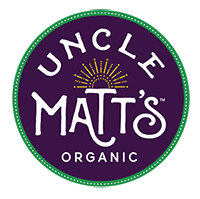Not only are Uncle Matt’s Organic products good for your body, but they’re also good for the planet.
Organic farming uses no synthetic fertilizers, pesticides, or herbicides. In fact, in order to be certified organic you must be free from these materials for a minimum of three years prior to your first harvest. Organic farming results in less damage to the environment and ecosystem. From the water we drink, to the soil we farm, to the air we breathe, less contamination means a safer planet for everyone. Uncle Matt’s Organic takes pride in protecting the next generation.
Why Choose Organic?
Funny to think about it, but until the 20th Century, the question of “why choose organic” didn’t even exist; food was organic! Beginning in the early 1900s, dramatic and simultaneous advances in biochemistry and engineering rapidly and profoundly changed farming practices and began to reshape the face of modern agriculture.
With the introduction of the tractor and synthetic fertilizers before World War II, hundreds of mechanized farm implements were made possible overnight, including the introduction of synthesized nitrogen fertilizer. Post-World War II, many farmers began to install large-scale irrigation, which helped facilitate the implementation of new chemical technologies such as ammonium nitrate and DDT. Farms grew bigger, and synthetic implements more frequent. This generated the kind of mass yields we see today in common crops. The era of the commercial farm was born.
As early as the 1920s, advocates of organic farming began to speak out. Agronomists such as Lord Northbourne and F.H. King envisioned agricultural practices that promoted healthy soil through natural means. The term, “organic farming” was coined by Northbourne to describe a holistic, ecologically-balanced approach to farming.
In every decade since then, organic proponents and researchers around the world have argued, and in many cases proven, the benefits of returning to an all-natural approach to farming – entirely free of synthetic fertilizers and man-made pesticides.
To answer the “why choose organic” question, one only need look at how the developments of the last century have taken us to where we are today: a nation largely ingesting marginally-nutritious food grown who-knows-where with who-knows-what sprayed on it or injected into it. This statement begs the next question: how do I know the food I’m buying is really organic?
Look for the Seal
In the 1980s, various farming and consumer groups began to pressure Congress for national standards in organic practices and certifications. This led to the 1990 Organic Foods Production Act (OFPA), with a subsequent ruling in 2000. Simply stated, the law ensures that all products labeled with the “Organic” seal adhere to the standards for ingredients and production methods set forth by the USDA.
OFPA created the National Organics Standards Board (NOSB) to advise and oversee all aspects of the law’s enactment. Together with the Organic Trade Association, Congress, USDA, and accredited certifiers, the NOSB works diligently to maintain the integrity of the organic industry.
Remember, “being certified organic” is to be given our nation’s stamp of approval for meeting the stringent requirements prohibiting the use of synthetic fertilizers, pesticides and chemicals in growing crops. While some inputs are allowed, they come from a very concise list and are naturally-occurring materials. For information on the list of approved inputs, visit www.USDA.gov.
Uncle Matt’s: Certified Organic for YOU
Here at Uncle Matt’s Organic, we’re proud to be certified organic and we want you, as the consumer, to have the complete assurance that when you buy Uncle Matt’s, you get USDA-certified organic quality.
We are certified through Quality Certification Services (QCS), respected as one of the best organic certifiers in the nation. To obtain organic certification through QCS, here are the steps we take every year:
1. Written application showing an organic farm management system
2. Submit history of management practices used on farm for previous three years
3. Soil tests
4. Crop plans
5. Field history sheets
6. Records showing organic plan has or will be followed
7. Sworn and notarized affidavit verifying all information is accurate, true and complete
8. Pledge of intent to adhere to standards for 12-month certification period
9. Agree to on-site field audits by inspectors, announced and unannounced
As you can tell, it’s quite the time-consuming process! Of course, it’s worth the effort. We know not only are we bringing our customers the healthiest, highest-quality citrus available, but we are also farming in such a way that considers the health of the environment and ecosystem as well.
One last note: beware of organic imitations. Because of the recent surge in popularity of organic products, there are many companies and products that may appear organic, but are not. Products labeled “pesticide screened,” “eco-friendly,” or “chem-free” are not organic. Be sure to look for proof of adhering to the organic certification rules and regulations. When in doubt, ask to see their certification from an accredited organization!
For More Information
For more “juicy” information on organics, being certified organic or the details of U.S. organic law, visit these comprehensive and reliable websites:
